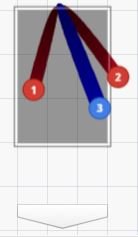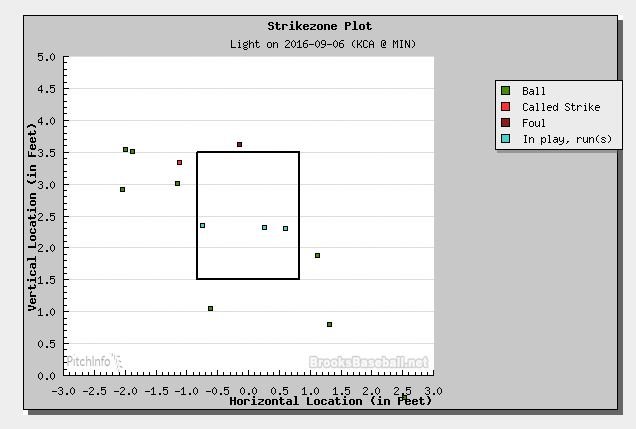Written By Brandon Warne (ColdOmaha.com)
If you hadn’t watched them both, you could be convinced that Tuesday’s game was simply a rerun of Monday’s. You know that classic story. Boy meets girl. Boy pops a few home runs. Girl runs away screaming.
Sorry.
The Twins started off gangbusters, not unlike Monday, only to have things fall apart down the stretch due to a leaky bullpen. Brian Dozier again did Brian Dozier things — though, like a mere mortal he hit just one home run — but ultimately the team faltered badly in the late innings in a 10-3 loss to the Kansas City Royals at Target Field on Tuesday night.
The Twins looked like they were going to put on an offensive show from the first inning on, but quite frankly their flame was extinguished quickly, while the Royals saved their best for last — literally.
Here’s what we saw from our seats:
Ervin Santana was rather good
He certainly wasn’t perfect, but after allowing a pair of runs in the first inning he settled down for a quality start with six innings, three earned runs on as many hits, six strikeouts and three walks. The big blast against Santana was a two-run home run by Kendrys Morales — his first of two on the night — that came after Eric Hosmer walked. Santana had Hosmer down 1-2 before walking him with three straight balls out of the strike zone low, and then was up 0-2 on Morales before he smoked the third pitch 432 feet to right for an early 2-0 Royals lead.
As you can see, pitch No. 3 was a mistake in location, and probably not an ideal 0-2 to throw to anyone, let alone someone of Morales’ pedigree.

Still, that didn’t sink Santana’s evening. Santana recovered to get the next 10 batters in a row before Alex Gordon led off the fifth with a six-pitch walk. Overall, Santana got outs from 13 of the 14 batters that followed the Morales home run — and 16 of 18 total — and didn’t allow a run until after he actually left the game, as reliever Ryan Pressly allowed an inherited runner to score to tie the game in the seventh. Ultimately, Santana worked ahead of hitters with first-pitch strikes to 19-of-24 batters faced, and gave the Twins the kind of outing a veteran stopper is supposed to. The rest of it just….didn’t pan out.
It was almost exclusively a fastball-slider night for Santana, as Brooks Baseball has him throwing 56 four-seamers, 39 sliders, three changeups and just one two-seamer. The slider induced eight swinging strikes, and overall he had pretty good swing-and-miss stuff, inducing whiffs on 14.1 percent of his pitches for the evening.
The Twins have five (!) hits in the first inning
Dozier homered and Jorge Polanco rolled an infield single to third before Joe Mauer grounded into a 4-6-3 double play. But while it appeared that Gee had danced out of danger with just the one run allowed, the Twins had different ideas as Plouffe homered to the bullpen in left-center, with Max Kepler and Eduardo Escobar following with singles before Kurt Suzuki flew to left to strand a pair of runners in a suddenly tied game.
….and just three the rest of the way
All of the damage done by the Twins offense came against Dillon Gee, who for all his first-inning warts still managed a quality start, as he more or less matched Santana statistically, less a few strikeouts. Joakim Soria, Kelvin Herrera and Brian Flynn combined to throw three scoreless innings with three strikeouts and just one baserunner allowed — a Mauer walk in the eighth. Ultimately, 10 of the last 11 Twins to hit made outs, working all the way back up to an Escobar single to center with two outs in the sixth.
Oh, and Escobar’s single snapped a streak of 10 straight Twins set down by Gee — which went back to a single in the third by Plouffe.
Dozier continues to be an absolute maniac
He’s now homered in five straight games, which ties him with Harmon Killebrew (on three occasions) and Marty Cordova as the only players in club history to do so. Cordova did so most recently, of course, between May 16-20 of his Rookie of the Year 1995 season.
Brian Dozier has 25 HR in 51 gms since the All-Star break, tied for 3rd-fewest gms to reach 25 post-break HR pic.twitter.com/vPC7HpES2c
— ESPN Stats & Info (@ESPNStatsInfo) September 7, 2016
It’s hard to know how to even classify this run for him anymore, so we’ll just run with this: as of the end of the game, Dozier was hitting an incredible .278/.349/.580. That’s a higher slugging percentage than everyone in the game except David Ortiz and Daniel Murphy — including Mike Trout, Kris Bryant, Nolan Arenado and Josh Donaldson — and his .386 wOBA has him right around guys like Arenado and Anthony Rizzo. Again, it’s just an incredible turnaround, and he’s doing it without three months of support. That is, he’s still got most of September to play, and was absolutely dreadful in April and May. He’s now up to 76 extra-base hits, which ties him with Zoilo Versalles (1965) for second-most in a single season by a Twins player ever.
Oh by the way, Versalles won the MVP that year.
For the first time maybe all year, Brandon Kintzler got singled to death
One night after all nine Royals in the starting lineup recorded at least one hit, their offense charged back with eight players recording at least one tally in the hit column, as even former Twins catcher Drew Butera got in on the action.
Kintzler came in to pitch in the eighth inning — something he’s done now in five of his last six appearances — and induced a rather harmless grounder to third from Morales for the third out. But like it did on Sunday, the ninth inning got away from Kintzler, and it happened pretty quickly. The Royals went single, single, walk, fielder’s choice and single. The last single not only plated the go-ahead run — ultimately leaving Kintzler on the hook for the loss — but chased the Twins’ closer from the game. It only went further sideways from there, as Kintzler, Ryan O’Rourke, Pat Light and J.T. Chargois combined to pitch a seven-run ninth inning. The final damage assessed to Kintzler was 0.2 innings, three hits, four runs (all earned) with no strikeouts and a walk. That raised his season ERA from 2.17 to 2.91.
That’s the life of a groundballer with great control but not a ton of swing-and-miss. Still, he’s spent most of the season doing a really, really great job, and his season ERA still pretty accurately reflects that.
Light just did not have it
From Brooks Baseball, here’s a look at where his location was:

Just three of Light’s 13 pitches were in the strike zone, as one might term this bit of accuracy as scattershot, at best. Light got no swinging strikes, and quite honestly got pasted pretty good. He didn’t record an out, and allowed a ball in play on his four-seam fastball and two on his splitter. In fact, it might be hard to see, but the three pitches he located in the strike zone — upon further zooming and examination — are all shaded light blue (aka, in play, run (s)). It doesn’t get much rougher than that.
It was just one of those nights:
— Brandon Warne (@Brandon_Warne) September 7, 2016
But there was some worry about Light’s velocity on Twitter while he was in the game, and according to Brooks he wasn’t far from normal. Brooks had him at 95.7 mph average on his four-seamer (96.2 max), and anywhere from 84-86 mph with his splitter. Brooks does list him as throwing some sliders, which came in at 93.3 mph on average (94.1 max). That’s where it gets confusing. On multiple occasions, he’s told me his “sliders” are just good splitters, but then why are they all the way up in the mid-90s when his usual splitters are more like 84-85?
Buddy Boshers, however, did
Boshers worked a clean inning with a pair of strikeouts, and while his ERA is still a bit ugly at 5.14, he’s got a 3.01 FIP, more than a strikeout per inning and a sparkling 29-4 K/BB ratio. It’s not all smoke and mirrors either; he’s got robust swinging-strike rates on his curve (20.5 percent) and changeup (14.3 percent), and has shown enough against righties that he’s not entirely just a LOOGY (lefty, one-out guy). Sure, the .492 slugging percentage against from righties isn’t ideal, but he does have a .254/.296/.492 slash line against from them, and the first two numbers aren’t that bad. Nor is his 17-3 K/BB ratio against righties. It just so happens that all three of the home runs he’s allowed this year, as wells as four of the six doubles, have come against righties. Still, he deserves a longer look next year.
One of Trevor Plouffe’s obliques (left) is bothering him
He left with a 1-2 count after fouling a pitch off from Herrera in the eighth inning, and was replaced by Kennys Vargas, who flew to center on the next pitch. The unfortunate part is that obliques are a tricky thing. Plouffe was on the disabled list earlier in the season with an intercostal strain, which isn’t the same injury but is in the same general area. But where it gets tricky is that they’re slow to heal, easy to aggravate and can nag on a player for weeks at a time. It’s not unreasonable for this to put him on the shelf for the rest of the season, but obviously more will be known when he gets an MRI on Wednesday. It’s unfortunate timing for Plouffe, whose offensive numbers were just starting to look more like what he’s accustomed to. The 30-year-old third baseman came into Tuesday’s action hitting .256/.300/.408 for the season, including a solid .265/.336/.429 in 25 games since returning from the disabled list in early August. We’ll update his status when more information is available.
—
Up Next: LHP Danny Duffy (11-2, 3.13) vs. RHP Kyle Gibson (5-9, 5.31) – 7:10 p.m. Wednesday
—
Notes & Quotes
- It was a Twins-centric evening out west, as Angels right-hander Ricky Nolasco briefly flirted with a perfect game before ultimately losing a 3-2 decision to the A’s on the road. By the way, guess who is starting for the Angels on Wednesday? That’s right, Alex Meyer, who was last on a big league mound in early May with the Twins in Houston.
- The Twins lost their third game in a row, and have lost 17 of their last 19 games. With a record of 51-88, they’re on pace for a 59-103 season, which would be the worst in post-DC franchise history. They need a 12-11 finish to avoid 100 losses for just the second time in club history.
- Twins manager Paul Molitor on the game getting away with a seven-run ninth, Santana: “Similar script (to Monday). I’m not sure how I answered that last night, but it’s probably not a lot different, though we made it interesting longer. Ervin pitched really well. I think it took something out of him, having to get out of those jams, when they had opportunities with men over at third base there a couple times with no out or one out. He made pitches. He kept us ahead.”
- Molitor on Dozier: “It’s kind of like a video game. It’s impressive to watch. You can tell the first couple pitches — he gets offspeed pitches — and then they try to throw a fastball away and he gets enough to do what he does. So kudos to him. The run continues, but I’m sure it’s frustrating for them, because I know it’s tough to go out there and let games slip away like that.”
- Santana on staying out of trouble: “Well, I made the right pitches at the right time. I know I had a lot of men on base in the first few innings, but I was not thinking about it, just trying to make a good pitch.”
- Santana on if leadoff batters reaching affects him: “Nah. Like I said, I was not thinking about it. I know we had the lead for a couple innings, and I’m just trying to keep the same score. Just trying to put a zero on the board, and that’s it.”
- Santana on how badly he wanted to pitch through the seventh: “Real bad. Because I need it, and we need it too. But at the same time, it’s not my decision and I respect that.”
- Santana on how tough it is to stay positive in a rough season: “Well you know, Kansas City is tough to beat. They don’t give you any chances. They fight every at-bat. They just find a way to do damage. You can see today after two outs, they did a lot of damage. That’s one of the teams that are hard to beat. We just have to come tomorrow, and keep playing hard.”








